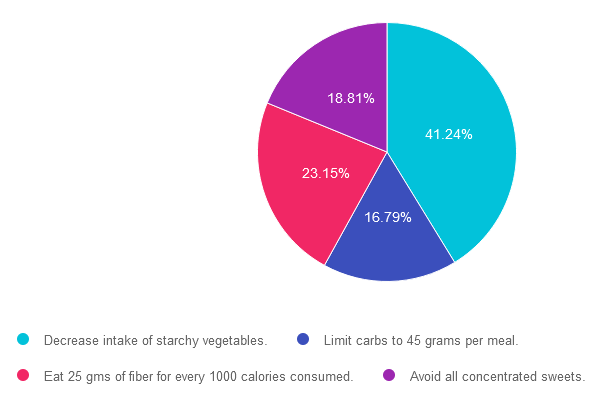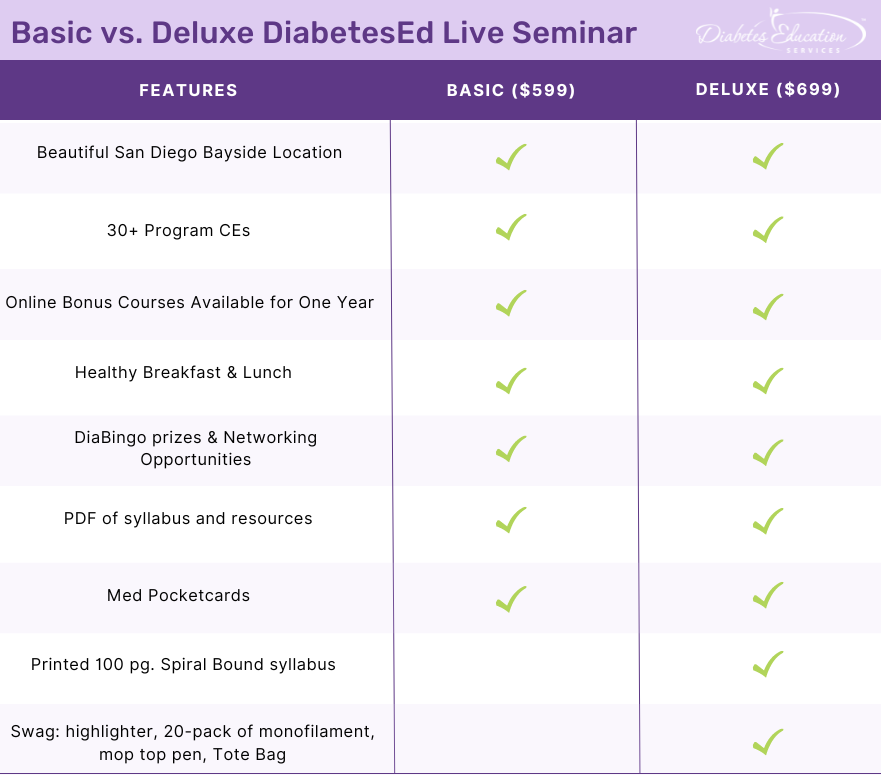
For last week’s practice question, we quizzed participants on ADA recommendations for meal planning with diabetes. 41% of respondents chose the best answer. We want to clarify and share this important information, so you can pass it on to people living with diabetes and your colleagues, plus prepare for exam success!
Before we start though, if you don’t want any spoilers and haven’t tried the question yet, you can answer it below: Answer Question
Question: Which of the following diabetes meal planning recommendations is accurate according to ADA Standards of Care?
Answer Choices:
- Decrease intake of starchy vegetables.
- Limit carbs to 45 grams per meal.
- Eat 25 gms of fiber for every 1000 calories consumed.
- Avoid all concentrated sweets.

Getting to the Best Answer
If you are thinking about taking the certification exam, this practice test question will set you up for success. Test writers anticipate possible answers based on the details in the question. They will wave those “juicy answers” right under your nose. Your job is to weed through the particulars, pluck out the most important elements and choose the BEST answer.
Answer 1 is correct. 41.24% chose this answer. “Decrease intake of starchy vegetables.” YES, this is the BEST answer. According to ADA Standard 5, “Reducing overall carbohydrate intake for individuals with diabetes has demonstrated evidence for improving glycemia and may be applied in a variety of eating patterns that meet individual needs and preferences. Eating plans should emphasize nonstarchy vegetables, fruits, legumes, and whole grains, as well as dairy products, with minimal added sugars. However, “macronutrient distribution should be based on an individualized assessment of current eating patterns, preferences, and metabolic goals.”
Answer 2 is incorrect. 16.79% of you chose this answer. “Limit carbs to 45 grams per meal.” This is a juicy answer, but is an older approach that is no longer recommended. According to ADA Standard 5, “Evidence suggests that there is not an ideal percentage of calories from carbohydrate, protein, and fat for people with diabetes. However, macronutrient distribution should be based on an individualized assessment of current eating patterns, preferences, and metabolic goals.”
Answer 3 is incorrect. About 23.15% of respondents chose this. “Eat 25 gms of fiber for every 1000 calories consumed.” WOW, that would be a LOT of fiber. This is a great number to know for certification exams. According to ADA Standard 5, “People with diabetes and those at risk for diabetes are encouraged to consume a minimum of 14 g of fiber/1,000 kcal, with at least half of grain consumption being whole, intact grains, according to the Dietary Guidelines for Americans.”
Finally, Answer 4 is incorrect. 18.81% chose this answer. “Avoid all concentrated sweets.” Even if you are not sure what the best answer is at first, this answer has two red flags, the word “avoid” and the word “all”. Since the ADA recommends flexibility and tailoring to the individual, this would not be the best person-centered answer. According to ADA Standard 5, “Dietary guidance should emphasize the importance of a healthy dietary pattern as a whole rather than focusing on individual nutrients, foods, or food groups, given that individuals rarely eat foods in isolation.”
We hope you appreciate this week’s rationale! For more info on ADA Standard 5, click here. Thank you so much for taking the time to answer our Question of the Week and participate in this fun learning activity!
Want to learn more about this practice question?
Join us LIVE in San Diego for our DiabetesEd Training Conference
October 11-13th, 2023

Two Registration Options

Join Coach Beverly and Team for two and a half days of knowledge-sharing, fun, networking, games with prizes, and “aha” moments in beautiful San Diego.
You don’t want to miss this one-of-a-kind learning opportunity. Get away from all those daily responsibilities and immerse yourself in a fun and intensive conference with plenty of networking opportunities.
Attendees will leave this conference with new tools and a more complete understanding of the latest advances in diabetes care, from medications to technology to Medical Nutrition Therapy!
Bring your colleagues and enjoy our friend discount.
Our team expertly translates the complex science of diabetes into understandable terms while keeping it real, practical, and fun.
Team of expert faculty includes:
- Diana Isaacs, PharmD, BCPS, BC-ADM, BCACP, CDCES – Educator of the Year, 2020
- Coach Beverly Thomassian, RN, MPH, CDCES, BC-ADM
- Ashley LaBrier, MS, RD, CDCES, Diabetes Program Coordinator
All hours earned count toward your CDCES Accreditation Information
Sign up for Diabetes Blog Bytes – we post one daily Blog Byte from Monday to Friday. And of course, Tuesday is our Question of the Week. It’s Informative and FREE! Sign up below!
The use of DES products does not guarantee the successful passage of the CDCES exam. CBDCE does not endorse any preparatory or review materials for the CDCES exam, except for those published by CBDCE.









